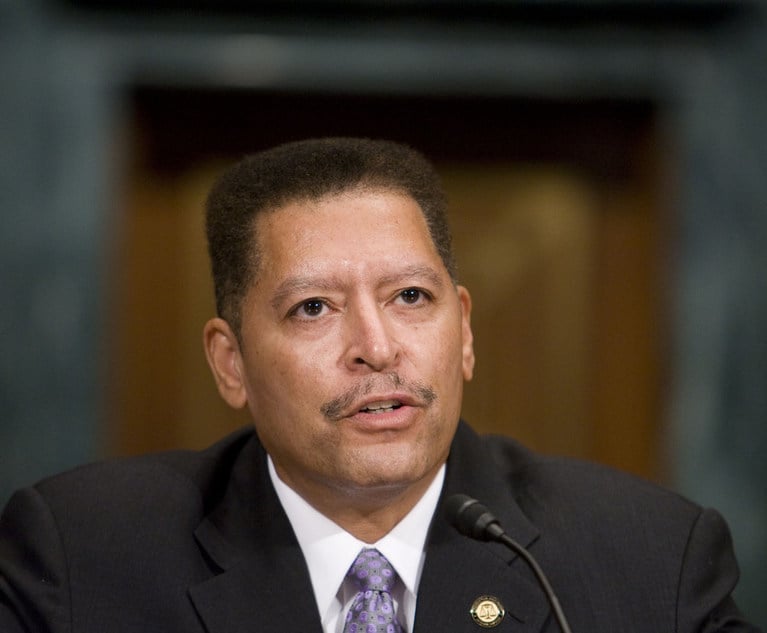 Judge James Wynn, during his confirmation hearing to become U.S. circuit judge for the Fourth Circuit. December 16, 2009. Photo by Diego M. Radzinschi/ALM.
Judge James Wynn, during his confirmation hearing to become U.S. circuit judge for the Fourth Circuit. December 16, 2009. Photo by Diego M. Radzinschi/ALM. Judge Calls Supreme Court Ruling That Overturned His Own a 'Stark Example of Judicial Activism'
Wynn outlined why he believes the majority's decision in Rucho v. Common Cause falls under judicial activism, which he defined as judges avoiding certain decisional tools normally used to adjudicate the case at hand.
September 29, 2021 at 02:25 PM
5 minute read
The original version of this story was published on National Law Journal
Appellate Judge James Wynn critiqued the U.S. Supreme Court's 2019 ruling that overturned his own opinion on partisan gerrymandering, calling the majority's decision a "stark example of judicial activism."
During an event held by Duke University's Polis: Center for Politics on Tuesday, Wynn outlined why he believes the majority's decision in Rucho v. Common Cause—which held that federal courts cannot handle partisan gerrymandering claims, when legislators draw electoral districts to benefit their party's power—falls under judicial activism. He defined judicial activism as when judges avoid certain decisional tools normally used to adjudicate the case at hand.
This content has been archived. It is available through our partners, LexisNexis® and Bloomberg Law.
To view this content, please continue to their sites.
Not a Lexis Subscriber?
Subscribe Now
Not a Bloomberg Law Subscriber?
Subscribe Now
NOT FOR REPRINT
© 2025 ALM Global, LLC, All Rights Reserved. Request academic re-use from www.copyright.com. All other uses, submit a request to [email protected]. For more information visit Asset & Logo Licensing.
You Might Like
View All
Sorry. We Can't Get to Your Case: Judge Speaks Out on Judicial Shortages

'Discordant Dots': Why Phila. Zantac Judge Rejected Bid for His Recusal
3 minute read
‘Old Home Week’: Justice Breyer Hears Challenge to Cruise Ship Ordinance in 1st Circuit
Trending Stories
- 1Court Rejects San Francisco's Challenge to Robotaxi Licenses
- 2'Be Prepared and Practice': Paul Hastings' Michelle Reed Breaks Down Firm's First SEC Cybersecurity Incident Disclosure Report
- 3Lina Khan Gives Up the Gavel After Contentious 4 Years as FTC Chair
- 4Allstate Is Using Cell Phone Data to Raise Prices, Attorney General Claims
- 5Epiq Announces AI Discovery Assistant, Initially Developed by Laer AI, With Help From Sullivan & Cromwell
Who Got The Work
J. Brugh Lower of Gibbons has entered an appearance for industrial equipment supplier Devco Corporation in a pending trademark infringement lawsuit. The suit, accusing the defendant of selling knock-off Graco products, was filed Dec. 18 in New Jersey District Court by Rivkin Radler on behalf of Graco Inc. and Graco Minnesota. The case, assigned to U.S. District Judge Zahid N. Quraishi, is 3:24-cv-11294, Graco Inc. et al v. Devco Corporation.
Who Got The Work
Rebecca Maller-Stein and Kent A. Yalowitz of Arnold & Porter Kaye Scholer have entered their appearances for Hanaco Venture Capital and its executives, Lior Prosor and David Frankel, in a pending securities lawsuit. The action, filed on Dec. 24 in New York Southern District Court by Zell, Aron & Co. on behalf of Goldeneye Advisors, accuses the defendants of negligently and fraudulently managing the plaintiff's $1 million investment. The case, assigned to U.S. District Judge Vernon S. Broderick, is 1:24-cv-09918, Goldeneye Advisors, LLC v. Hanaco Venture Capital, Ltd. et al.
Who Got The Work
Attorneys from A&O Shearman has stepped in as defense counsel for Toronto-Dominion Bank and other defendants in a pending securities class action. The suit, filed Dec. 11 in New York Southern District Court by Bleichmar Fonti & Auld, accuses the defendants of concealing the bank's 'pervasive' deficiencies in regards to its compliance with the Bank Secrecy Act and the quality of its anti-money laundering controls. The case, assigned to U.S. District Judge Arun Subramanian, is 1:24-cv-09445, Gonzalez v. The Toronto-Dominion Bank et al.
Who Got The Work
Crown Castle International, a Pennsylvania company providing shared communications infrastructure, has turned to Luke D. Wolf of Gordon Rees Scully Mansukhani to fend off a pending breach-of-contract lawsuit. The court action, filed Nov. 25 in Michigan Eastern District Court by Hooper Hathaway PC on behalf of The Town Residences LLC, accuses Crown Castle of failing to transfer approximately $30,000 in utility payments from T-Mobile in breach of a roof-top lease and assignment agreement. The case, assigned to U.S. District Judge Susan K. Declercq, is 2:24-cv-13131, The Town Residences LLC v. T-Mobile US, Inc. et al.
Who Got The Work
Wilfred P. Coronato and Daniel M. Schwartz of McCarter & English have stepped in as defense counsel to Electrolux Home Products Inc. in a pending product liability lawsuit. The court action, filed Nov. 26 in New York Eastern District Court by Poulos Lopiccolo PC and Nagel Rice LLP on behalf of David Stern, alleges that the defendant's refrigerators’ drawers and shelving repeatedly break and fall apart within months after purchase. The case, assigned to U.S. District Judge Joan M. Azrack, is 2:24-cv-08204, Stern v. Electrolux Home Products, Inc.
Featured Firms
Law Offices of Gary Martin Hays & Associates, P.C.
(470) 294-1674
Law Offices of Mark E. Salomone
(857) 444-6468
Smith & Hassler
(713) 739-1250









